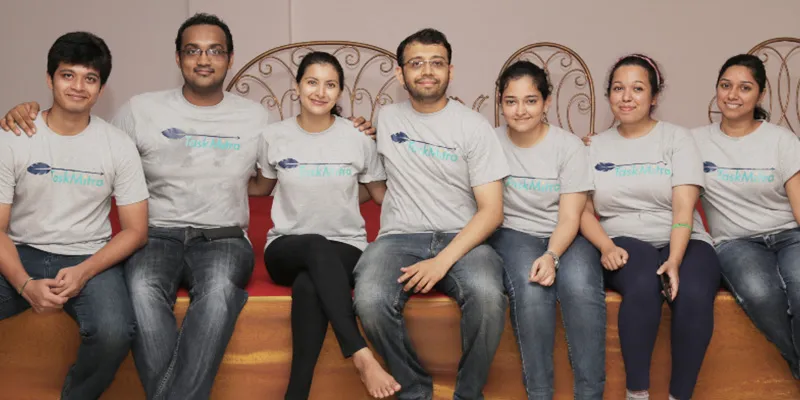TaskMitra introduces crowdsourced consumer service platform for professionals, amateurs, even part-timers
It was New Year’s Eve and Gautam Gokhale and Ushma Khabaria were busy planning a house party. However, the whole planning and arrangement turned out to be exhausting, including the aftermess that followed. They wished they had a little help. And this was eureka business moment for them, when they decided to build a platform where one could just say what you need, when you need it, and at what price. Surely, there would be someone (professionals, amateurs, or even part-timers) around you wanting to earn some extra money by lending their services. It was this concern that led to the idea of TaskMitra in March 2015.

They conceptualised TaskMitra to be such a platform that assists people find the right kind of mitra (buddy) around town. TaskMitra, a crowdsourced task marketplace, claims itself to be a one-stop solution for all the services. People can use TaskMitra to fulfil all kinds of tasks, from finding a cycle teacher to a home gardening enthusiast to a person with good handwriting to make personal invites. Not being limited to a few services, it is a platform that allows everyone with certain skills, talent, and experience to provide services and help users. It claims to offer a complete solution in B2B, B2C, and C2C segment.
“We conceptualised TaskMitra with the focus on three key aspects — build a work broadcast platform, provide a browse task segment, and keep it crowdsourced,” says Gautam, CTO, TaskMitra.
He adds that the platform emphasises on community integration by getting broadcasters and mitras on a single organised platform to collaborate seamlessly for every kind of tasks. Although most mitras are professionals service providers, you can also find freelancers, part timers, homemakers, students, and experienced retirees.
Revenue model and growth
Starting out with an initial capital of Rs 4 lakh the platform is completely bootstrapped. So far, the co-founders have invested Rs 10 lakh in the product. The amount spent have gone in maximising the size of the team and improve technology.
Currently, TaskMitra is free to use. But it plans to charge a percentage of the task amount as dependent on task category and other parameters. “We would be launching premium features which would be subscription-based,” says Gautam.
Since its launch, it claims to have completed more than 6,000 tasks, amounting to excess of Rs 1.75 crore. There are 27,000 verified users and 30 per cent repeat customers on its platform. “We are achieving 12 per cent w-o-w growth with no ad spend and 95 per cent lower cost of acquisition per customer as compared to our competitors. We aim to have nearly 2,50,000 verified users by Q2 2016,” says Gautam.
Concentrating solely on Mumbai for now, it aims to expand to Pune and Bengaluru by the First quarter of 2016. However, its next step will be to launch a mobile app that will help us take social collaboration to the next level with multilingual interface and other innovative features.
Big Data
With a large chunk of growing transactions and users, TaskMitra is focusing on data and has implemented a strong footing in Big Data and machine learning.
"Data points, which are captured are formatted, stored & analyzed, which helps us to gain useful insight to increase revenues, get & retain customers, and improve operations efficiency. We plan to setup full-fledged data science lab soon," says Gautam.
Market and competition
In a large economy like India, the market size of local services is worth USD 50 billion, and which is growing continuously.
Other startups operating in the same segment are Urbanclap, Doormint, TimeSaverz, Mr. Right, Taskbob, and Zepper, among others. Listing portals such as JustDial, Sulekha, YellowPages, Near.in; and providers such as Jack on Block, Hammer and Mop also pose indirect competition.
During August this year, Doormint raised USD 3 million funding led by Helion Ventures and Kalaari Capital. In April 2015, Taskbob raised USD 1.2 million worth of seed funding from Orios Venture Partners and the Mayfield Fund. In June this year, UrbanClap raised USD 10 million in Series A funding. In July, Zimmber secured USD 2 million from IDG Ventures, Omdiyar Networks, and others.
On competition, Gautam says, “We are divergent in business as we are using a crowdsourced platform approach to disrupt the service industry that’s been highly dominated by service or product quality. Today, as technology is enabling trust and friendship amongst strangers, TaskMitra is trying to reinstate a buddy system where people can freely connect and seek help from each other. This approach not only allows us to gain traction but also helps create a new source of supply which is unexplored.”
He adds that as there are many of competitors, shakeouts are inevitable. Surviving rivals will have to grow faster than the market. It is not only incumbent rivals that pose a threat to firms in this industry; the possibility that new firms may enter the industry also affects competition. This sector is expected to witness a lot of M&A action in near future.







